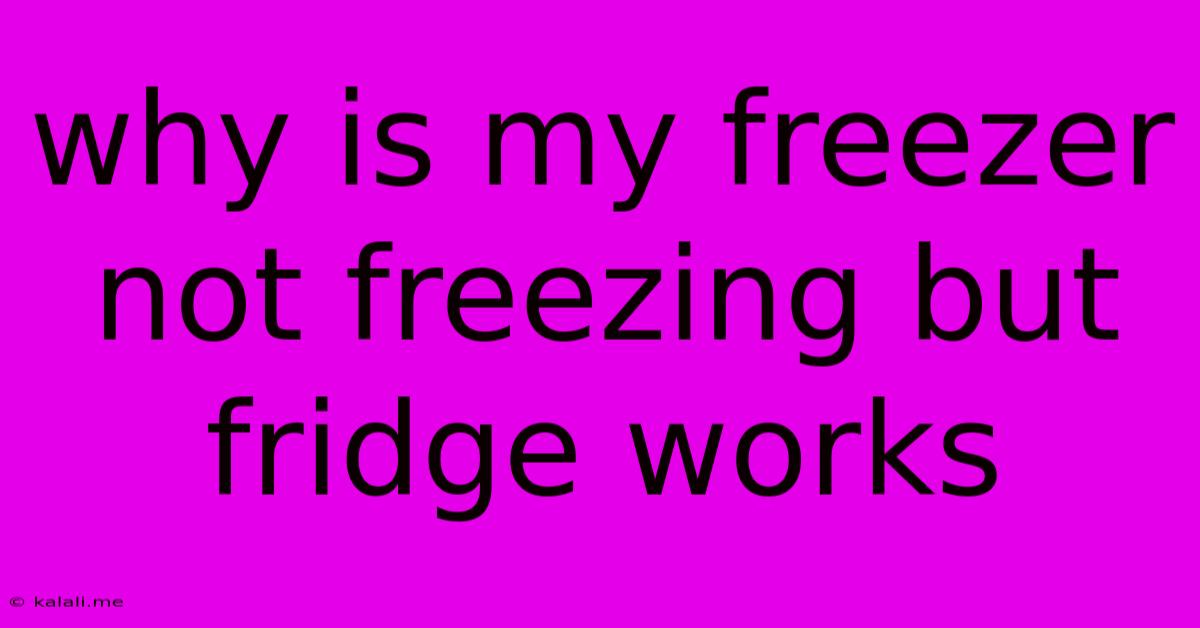Why Is My Freezer Not Freezing But Fridge Works
Kalali
Jun 02, 2025 · 4 min read

Table of Contents
Why is My Freezer Not Freezing But Fridge Works? Troubleshooting Common Causes
Is your refrigerator humming along happily, keeping your milk perfectly chilled, but your freezer stubbornly refusing to freeze? This frustrating problem can stem from several different issues, but don't panic! This guide will walk you through the most common culprits and how to troubleshoot them. Understanding the problem often leads to an easy fix, saving you the cost of a potential repair call.
Understanding Your Refrigerator's Cooling System: Before diving into the troubleshooting, it's helpful to understand the basics. Most refrigerators use a refrigerant cycle. A compressor pumps refrigerant through coils, absorbing heat from the inside of the fridge and freezer. This heat is then released outside the appliance, resulting in a cooling effect. If any part of this cycle malfunctions, freezing problems can arise.
1. Check the Obvious: Temperature Settings and Door Seals
Let's start with the simplest possibilities. These are quick checks that can often resolve the issue without further investigation.
- Temperature Settings: Are your freezer and refrigerator temperatures set correctly? The freezer should be at 0°F (-18°C) or lower. Check the control panel and adjust accordingly. Sometimes a simple adjustment is all that's needed.
- Door Seals: Inspect the seals around both the freezer and refrigerator doors. Are they intact and sealing properly? A damaged seal allows warm air to enter, hindering the cooling process. A simple test involves placing a piece of paper along the seal and closing the door. If the paper is easily pulled out, the seal needs attention or replacement.
2. Frozen Evaporator Coils: Ice Buildup
A common cause of a freezer not freezing while the fridge works is excessive ice buildup on the evaporator coils (located inside the freezer compartment). This ice acts as an insulator, preventing efficient heat transfer.
- Defrosting: If you have a frost-free freezer, the automatic defrost cycle may be malfunctioning. This requires professional attention. However, if you have a manual-defrost freezer, you'll need to manually defrost it. This involves unplugging the appliance, removing all food items, and allowing the ice to melt completely. Note: This process can take several hours or even overnight.
3. Faulty Fan Motor: Air Circulation Issues
Many modern refrigerators use a fan motor to circulate cold air between the freezer and refrigerator compartments. If this fan malfunctions, the freezer won't receive the cold air it needs to function properly.
- Fan Motor Check: Listen for the fan motor running. If it isn't running or making unusual noises, it could be faulty and require replacement. This is generally a more advanced repair that often requires professional assistance.
4. Refrigerant Leaks: A Serious Problem
Refrigerant leaks are less common but can cause major cooling issues. A significant refrigerant leak will severely impair the freezer's ability to freeze, even if the refrigerator is working. This usually requires a professional repair as handling refrigerants requires specialized tools and knowledge.
- Signs of a Refrigerant Leak: Look for any unusual noises from the compressor or a noticeable decrease in cooling efficiency over time. Refrigerant leaks often require professional diagnosis and repair.
5. Compressor Issues: The Heart of the System
The compressor is the heart of the refrigeration system, responsible for circulating the refrigerant. A malfunctioning compressor can lead to a variety of cooling problems, including a non-freezing freezer. This is a serious issue that often necessitates professional repair or replacement of the entire appliance.
- Compressor Signs: Listen for unusual noises like grinding or clicking sounds. Consistent overheating of the compressor could also be a strong indication of a problem.
When to Call a Professional
If you've checked the obvious issues (temperature settings, door seals, ice buildup) and still can't pinpoint the problem, it's best to call a qualified appliance repair technician. Issues like refrigerant leaks, faulty fan motors, or compressor problems require specialized knowledge and tools for diagnosis and repair. Attempting to repair these issues yourself could void any warranty and potentially cause further damage.
By systematically working through these troubleshooting steps, you can often identify the cause of your freezer's malfunction. Remember to always prioritize safety and don't hesitate to seek professional assistance when needed.
Latest Posts
Latest Posts
-
How To Get Urine Out Of Rug
Jun 04, 2025
-
Why Does Pilot Light Go Out
Jun 04, 2025
-
T Sql Select Result From Stored Procedure
Jun 04, 2025
-
What Block Can Spiders Not Climb
Jun 04, 2025
-
What Are Songs Without Lyrics Called
Jun 04, 2025
Related Post
Thank you for visiting our website which covers about Why Is My Freezer Not Freezing But Fridge Works . We hope the information provided has been useful to you. Feel free to contact us if you have any questions or need further assistance. See you next time and don't miss to bookmark.